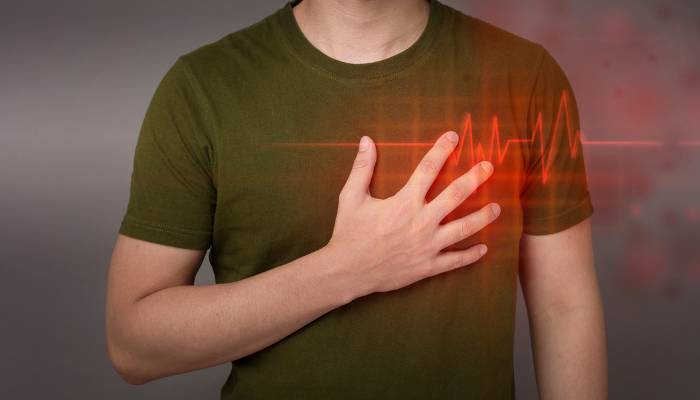
Although medical professionals classify addiction as a chronic disorder, it never occurs in a vacuum. Rather, many people who struggle with addiction have a co-occurring mental or medical disorder. This is because substance abuse can affect your mental and physical health. One of the ways it impacts your physical health is by impairing cardiovascular function, which is necessary to survive.
Let’s look at what heart condition is caused by drug use, how addiction affects the heart’s functions and potential treatment options.
How do Drugs Affect the Heart?
The effects of addiction on your heart will differ depending on the substances you take. Similarly, drugs can have short-term and long-term effects on the heart that are important to know. Let’s discuss how each drug affects the heart while understanding what drugs cause an enlarged heart and what illegal drugs cause heart attacks.
Cocaine
While all illicit substances and alcohol can adversely affect the heart, cocaine has the highest potential for drug overdose and heart attack. When your body metabolizes the substance, it can lead to serious medical concerns like coronary artery disease. And as the dosage increases, so does the risk of a medical emergency.
- Coronary artery disease is characterized by plaque buildup in the arteries inner walls, causing them to narrow.
- Cocaine causes your blood pressure to rise, which increases the risk of a stroke and heart attack.
- Research indicates that cocaine users suffer from enlarged left ventricles, also known as left ventricular hypertrophy. It can lead to poor circulation and increased blood pressure.
- Cocaine shifts the potassium and sodium ion channels, which can lead to irregular or elevated heart rates.
All these factors can combine to cause medical emergencies like a heart attack, stroke, or even congestive heart failure. The risk for such health concerns increases drastically when you have a history of cocaine use, so you can expect them long-term.

Methamphetamine
Studies show that methamphetamine use is linked to a high risk of heart failure and other cardiovascular issues. Like cocaine, methamphetamine is also a stimulant that increases your heartbeat and causes cardiac hypertrophy. The condition refers to the thickening of the heart’s walls, which makes it harder for the heart to pump blood.
- Prolonged use of methamphetamine strains the cardiovascular system, which can lead to an enlarged heart.
- Long-term effects include weakening the heart’s walls, also known as systolic cardiomyopathy.
- Meth use is linked to an irregular heartbeat.
- It causes plaque buildup and narrowing of the blood vessels, which increases the risk of a heart attack.
Although overdose is cited as one of the major causes of death among meth users, it’s important to consider cardiovascular emergencies like heart failure as a fatal effect of meth use.
Nicotine
Researchers have found that, on its own, nicotine doesn’t have a detrimental effect on the heart. This can include sources of nicotine such as patches and gum. On the other hand, non-combusted nicotine, such as that in cigarettes, can still lead to adverse effects. It’s why doctors recommend that you avoid all sources of nicotine.
Cigarettes, a primary nicotine source, can lead to several cardiovascular issues. Chronic smoking can cause the blood vessels to accumulate plaque, which narrows them and causes a higher risk of heart attack. Moreover, it leads to higher levels of LDL cholesterol and triglycerides in the blood, which is bad for the heart.
Alcohol
Millions of Americans are struggling with alcohol addiction, one of the main addictions being treated at United Recovery CA. A common misconception about alcohol use is that it can deteriorate the liver and impair its function. However, studies prove chronic alcohol use can lead to several cardiovascular issues. Reviews of patients’ health records show that alcohol use is linked to three main heart problems.
The first is congestive heart failure, which refers to the inability to pump blood to all body parts. This happens after chronic alcohol abuse, which can lead to elevated LDL levels and stiffening of the ventricles – both of which predispose you to congestive heart failure.
The second is a myocardial infarction, also known as a heart attack. An MI is the result of a blood clot blocking the flow of blood to the heart. It’s a medical emergency that requires immediate care to avoid death. The third is atrial fibrillation, which refers to an irregular heartbeat. While it’s not fatal, it makes you susceptible to heart failure, blood clotting, and stroke.
These conditions pose a serious risk to your ability to perform everyday activities and should be taken seriously if you wish to make a full recovery.
Opioids
Opioid addiction involves the use of heroin or misusing prescription painkillers like morphine and oxycodone. Although it causes the most overdose-related drugs among any other substance, it largely increases your risk of heart problems. It’s one of the worst drugs that damage heart valves due to the link between intravenous drug use and endocarditis.
- Opioids cause changes to the heart’s electrical activity, which causes you to breathe differently while you sleep. This could affect your heart rate and even lead to atrial fibrillation.
- Opioid overdose is often the result of cardiac arrest, which is when the heart stops beating. This happens because the drug slows down your breathing and heart rate.
- Taking heroin via intravenous injection can lead to a bacterial infection of the heart. This happens when bacteria and other germs travel from the injection site into the blood vessels, eventually infecting the heart.
- Various studies show that chronic use can potentially lead to heart failure.
In the case of infected heart valves, immediate antibiotic treatment is necessary. If it’s delayed, you may have to get the valves replaced. Keep in mind that if you do replace your heart valves, they will be highly vulnerable to infection. Therefore, it’s crucial to manage your substance abuse issue before moving forward with replacement surgeries.

Signs of Heart Damage from Drugs
It’s crucial to seek appropriate treatment for drug-induced cardiovascular issues before it’s too late. Before recommending treatment, your physician will look for signs that you’re dealing with heart damage due to drug use. These can include:
- Heart palpitations
- High or low blood pressure
- Racing heartbeat
- Shortness of breath
- Chest pain
If you’re suffering from the above-mentioned issues, you should schedule an appointment with your physician as soon as possible. It’s likely that the following issues are the cause:
- An abnormally slow or fast heart rhythm, also known as arrhythmia
- Poor oxygen levels and low blood supply to the heart
- Weakened heart muscles that make it difficult for the heart to pump blood, also known as cardiomyopathy
- Poor heart muscle contractions
- Diseased or dying muscle cells in the heart
These are some of the symptoms that your doctor will look for to diagnose you with a cardiovascular disorder.
Can Your Heart Heal From Drug Abuse
While it’s not possible to reverse the effects of drug use on cardiovascular health, it’s certainly possible to manage them. Studies show that participants who quit using methamphetamine showed improvement in heart function. Once you stop drug use, it reduces your risk of death due to heart disease and hospitalization due to heart failure.
Of course, no treatment will be effective without stopping drug use, so it’s important to seek professional help from a rehab center. There, you’ll learn to tackle your addiction through intensive therapies that teach you to cope with stressful behaviors healthily. If you suffer from drug-induced cardiovascular issues, a luxury rehab center will prepare a customized treatment plan that involves improving your physical health as well.

Lifebing is driven by an unrelenting passion for promoting health and well-being, our team is wholly committed to curating exceptional content and immersive experiences.
